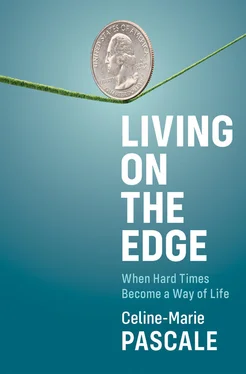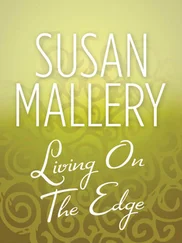Among those who were already living paycheck to paycheck before the pandemic, the ability to stay home and socially isolate has been an inaccessible form of privilege. Low-wage workers who have been declared “essential” are forced to work – often in unsafe conditions and without the benefit of health insurance or sick leave. This is a virus that impacts everyone, but, like all disasters, it doesn’t impact everyone equally. For example, we know that people with preexisting health conditions, especially those with respiratory problems, are particularly vulnerable. Poor communities carry the heaviest burdens of pollution, which contributes to these conditions. Living on the Edge is about more than individual troubles; it is the story of a nation in a deep economic and moral crisis. Responding to this crisis requires more than a sense of duty to help others; it requires a moral obligation to ensure a self-sufficient life is possible for all. To fight inequality is to fight to change the system.
Systemic economic inequality is not the result of individual choices. It is the inevitable consequence of a government overtaken by corporate interests. This is not new. Fortunately, history has shown us over and again that when millions of Americans come to realize just how badly the deck is stacked against them, they will mobilize. In 2017, the coal company Blackjewel abruptly declared bankruptcy and said it was unable to pay what it owed to 1,700 miners in Kentucky, West Virginia, and Virginia. The company might have imagined it would get away with this because there are no longer any unionized coal mines. But in Kentucky, miners and their families occupied railroad tracks in Harlan County to stop trains loaded with $1.4 million worth of coal from leaving. 13For thirty-eight days, they lived, slept, and ate in a blockade across the train tracks. The coal miners prevailed and Blackjewel eventually agreed to pay $5.7 million in back wages. So much for being broke.
While dramatic stories like that of the Blackjewel miners tend to be the exception, workers demonstrate over and again that they are resilient and determined. Living on the Edge is also the story of people who have a vision of the future in which everyone earns a living wage, has access to health care, education, and affordable housing; a world in which everyone enjoys communities free from environmental degradation. These are not the expensive dreams of idealists, or the radical dreams of an un-American few. They are the aspirations of working people who know that the system we have in place is unsustainable for most of the US population.
1 1 See, for example, https://www.epi.org/productivity-pay-gap.
2 2 Polls done by Nielsen and Harris for the American Payroll Association and CareerBuilder, respectively, were widely reported in news media. See, for example, http://press.careerbuilder.com/2017-08-24-Living-Paycheck-to-Paycheck-is-a-Way-of-Life-for-Majority-of-U-S-Workers-According-to-New-CareerBuilder-Survey.
3 3 FOTTRELL, Q. 2018. 50 Million American Households Can’t Even Afford Basic Living Expenses. Market Watch, June 9.
4 4 See https://www.ers.usda.gov/topics/rural-economy-population/rural-poverty-well-being.
5 5 LOWREY, A. 2020. The Great Affordability Crisis Breaking America. The Atlantic, Feb 7; BOARD OF GOVERNORS OF THE FEDERAL RESERVE SYSTEM. 2019. Report on the Economic Well-Being of U.S. Households in 2018.
6 6 WILE, R. 2017. The Richest 10% of Americans Now Own 84% of All Stocks. Money, Dec 19.
7 7 Details of the interview process and interviewees are in the appendices.
8 8 Scholars refer to this as economic precarity. In this book, I write about precarity as people describe it: a state of perpetual vulnerability, high risk, and bad choices. See Appendix A for theories of precarity.
9 9 REICH, R. B. 2020. The System: Who Rigged it, How We Fix It, New York, Alfred Knopf, p. 15.
10 10 HART-LANDSBERG, M. 2018. Class, Race, and US Wealth Inequality. Reports from the Economic Front. At https://economicfront.wordpress.com/2018/01/03/class-race-and-us-wealth-inequality.
11 11 In the US, the response to, and impact of, the pandemic has been politicized by systemic disinformation campaigns that continue to declare the Covid-19 virus a hoax and claim that mask mandates are an infringement on personal freedom.
12 12 AMERICANS FOR TAX FAIRNESS. 2020. Net Worth of Billionaires Has Soared by $1 Trillion – to the total of $4 Trillion – Since the Pandemic Began. At https://americansfortaxfairness.org/issue/net-worth-u-s-billionaires-soared-1-trillion-total-4-trillion-since-pandemic-began; see also COLLINS, C. 2020. Updates: Billionaire Wealth, U.S. Job Losses and Pandemic Profiteers. At https://inequality.org/great-divide/updates-billionaire-pandemic.
13 13 Harlan County earned the nickname “Bloody Harlan” after a series of labor strikes in the 1930s were met with violent attacks initiated by coal corporations and law enforcement agencies.
When I began the research for this book, I had expected to hear stories of hard choices. I did indeed hear plenty of these. Many people talked about having hard conversations over the dining-room table about which bills to pay at the end of the month. Across the country I met working people who are forced to make impossible choices from a range of bad options. For example, in many communities it is impossible to hold a job if you don’t own a car. Consequently, more than one person faced the choice of either taking out a second loan to cover the payments on their car loan, or losing their job.
I talked with people who have watched their communities succumb to drug addiction and with some who battle addiction themselves. And, I learned there is a surprising amount of money to be made off of the backs of people who struggle to pay their bills – by driving people into poverty and then keeping them trapped there. The lives of the people I talked with unfolded in ways that seem both ordinary and heroic. I hope their stories “true the wheel” of the nation’s understanding of poverty: how it is created, lived, and lied about. I want to say from the start that I write this book with skin in the game.
The early part of my life was spent playing in woods, climbing apple trees, and catching salamanders in Southwestern Pennsylvania. Nearly everything we ate, my mother either grew or made from scratch. I was twelve before I learned that applesauce came in a jar and potato chips were sold in bags. I carried sugar and margarine sandwiches with me to school for lunch and reveled in bologna sandwiches, when we could afford them. We lived among farms and fields that were being sold off to real estate developers. The area steadily grew into a very wealthy suburban community. This development and my father’s health crisis forced us to move to a run-down, rented house on the edge of a middle-class suburb. As a child playing in dying orchards and new construction sites, I had not recognized that we lived in a segregated community. A few years after moving to the suburb, I understood that our new community was intentionally segregated. This was first made apparent by responses at school to my favorite book, The Autobiography of Malcolm X , and by my family’s discussion of a rumored local cross burning. My response was a fierce commitment to anti-racism before I had any realistic idea of what that would entail. It turns out that racist perspectives seep into the ordinariness of a child’s life – through everything from nursery rhymes to classroom lessons. My commitment to anti-racism has been forged through a lifetime of unlearning.
In our new home six of us shared a bathroom, and “going to the library” was the code we used when planning to take a while in there. I believe I am the only member of my family to actually use a public library. At my new school I met kids whose parents were professionals and took vacations in Europe. Yet my family consistently formed relationships with white people like us, people who lived on the economic margins. For much of my life, just keeping food on the table was an issue for our family. I remember helping my mother steal bags of potatoes from the grocery store. I remember the numbness that would overwhelm me when I found the kitchen cabinets and refrigerator all empty. And I remember that more than once my mother sold her blood to blood banks in order to buy groceries for us. We had informal resources: a butcher who gave my mother baloney butts and soup bones, a relative in a convent who gave us underwear, and other people who passed along clothes. The funny thing is that we told the world, and firmly believed, that we were middle class. We weren’t trying to deceive ourselves or others. There simply wasn’t a language for our experience that encompassed both the struggle and the dignity.
Читать дальше












